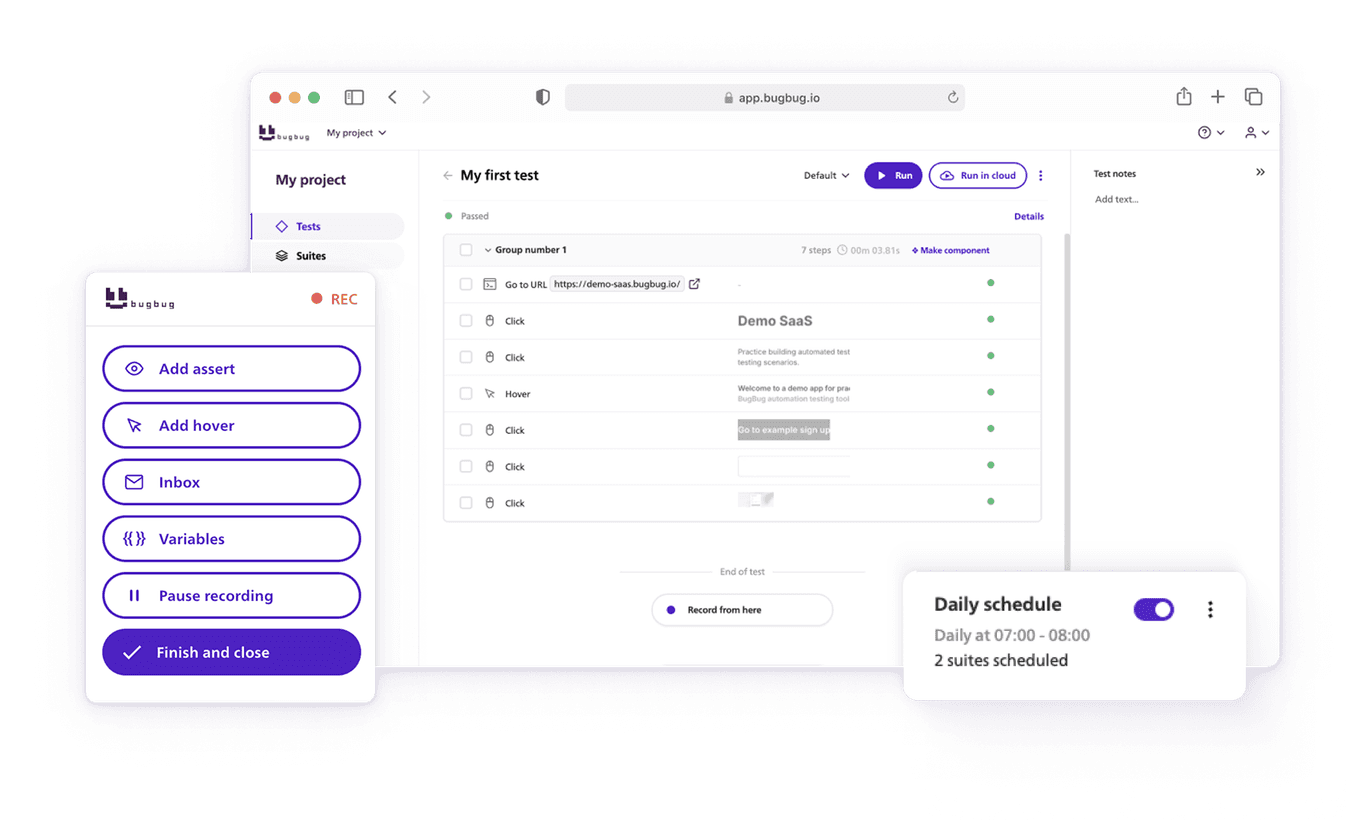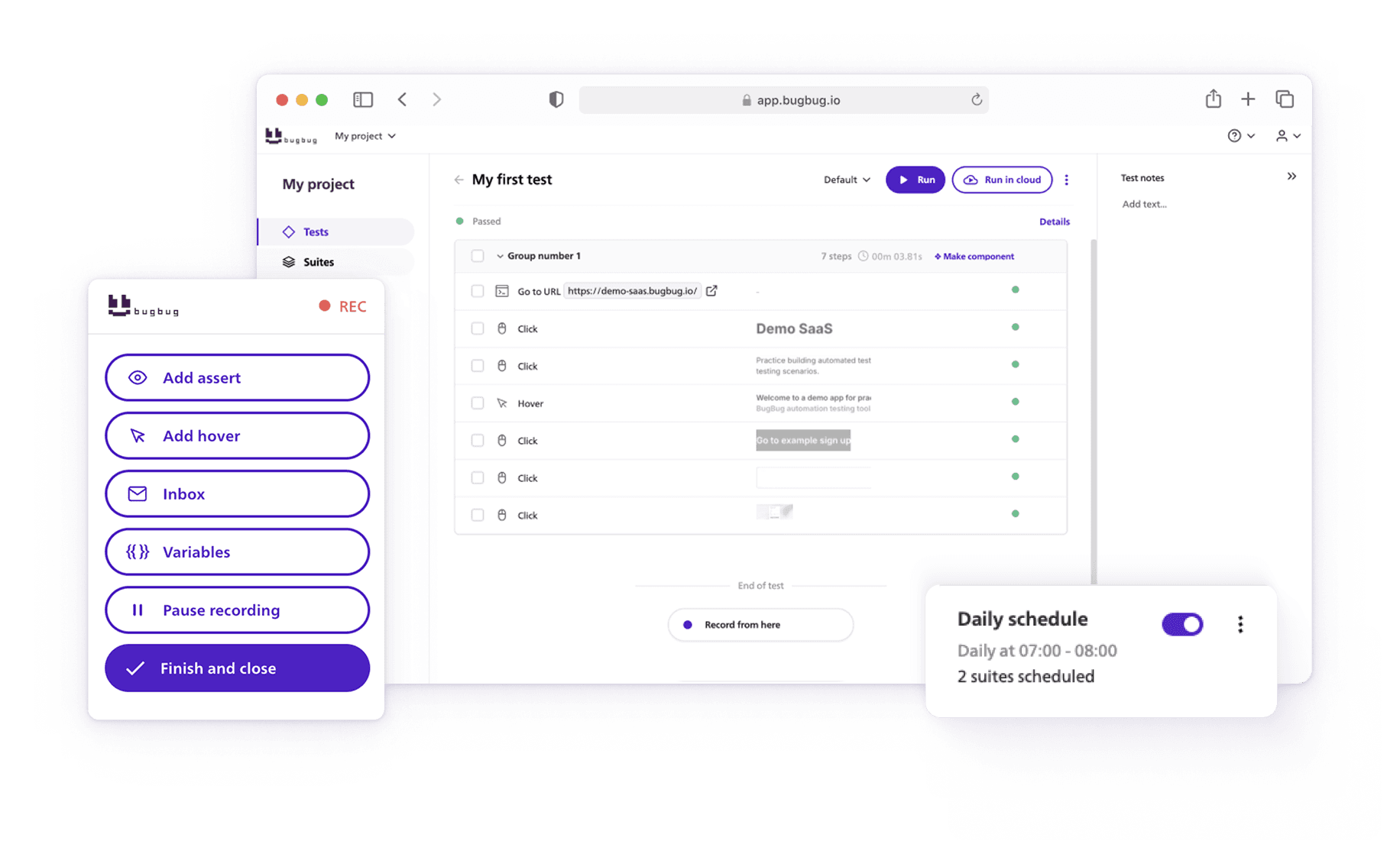You’ve put in the work to build solid automated tests. Great start. But here’s the thing—tests that don’t run regularly won’t catch bugs. And if you’re manually triggering them every week, well… that’s a lot of clicking and hoping.
This is where test scheduling comes in. It’s the not-so-secret weapon behind stable releases and stress-free QA cycles. Whether you’re a solo founder, part of a growing startup, or managing a large QA team, scheduling your tests to run automatically can save hours of manual work—and catch issues before your users do. Test scheduling empowers individuals and organizations across various industries by providing a reliable way to ensure quality and efficiency in their development processes.
🎯 TL;DR – Why Test Scheduling Matters
- Test scheduling automates your QA process, ensuring consistent, timely test runs without manual effort—saving hours and catching bugs early.
- Running tests regularly (hourly, nightly, etc.) improves release stability, reduces last-minute issues, and keeps your app monitored 24/7.
- BugBug makes scheduling tests simple and code-free, with an intuitive UI, Slack/email alerts, and no need for CI/CD setup or engineering support.
- You can create multiple schedules for different environments (e.g., production hourly, staging nightly), and get detailed failure reports in your inbox.
- BugBug’s auto-retry, cloud runs, and affordable plans let even lean teams automate confidently—so you can scale quality without extra workload.
Check also:
Users need to input their contact information during the scheduling process to ensure seamless communication and effective appointment management.
In this guide, we’ll break down what test scheduling is, why it’s essential, and how to set it up using a no-fuss tool like BugBug. Our scheduling software has the ability to customize booking processes, handle various scheduling needs, and manage appointment availability seamlessly, allowing users to effectively schedule tests and appointments across different service locations. Test scheduling is particularly relevant for business schools and educational institutions, showcasing its effectiveness in managing appointments and improving communication.
Additionally, we emphasize our strong commitment to customers and the importance of customer support in the scheduling process.
What Is Test Scheduling?
Test scheduling is exactly what it sounds like: setting your automated tests to run on a regular schedule without any manual input. This automation helps test takers by reducing manual effort and ensuring a seamless process.
Instead of logging in and hitting “Run” every time you deploy or change something, a scheduler handles it for you. That could mean:
- Running smoke tests every hour
- Kicking off a full suite overnight
- Checking your production environment every morning before your team starts work
In short, test scheduling ensures your app is being monitored even when you’re not looking. It also ensures optimal conditions for test scheduling, providing a stress-free experience.
Our dedicated support teams are prepared to respond quickly to any issues that may arise during the scheduling process. These committed teams ensure a reliable and smooth scheduling experience.
Why Test Scheduling Matters
Here’s why QA teams (and devs, and product managers…) love scheduling:
- Consistency: Automate test runs so you never forget to do it manually. Test scheduling saves money by automating tasks and improving efficiency.
- Speed: Catch bugs early and reduce the time between a change and a test failure.
- Coverage: Monitor multiple environments—staging, production, test. Test scheduling integrates with the broader academic calendar and course management.
- Peace of mind: Know your app is being watched 24/7. Pursuing one's goals is made easier with the help of reliable test scheduling.
- Security: Monitor exam hours and ensure a secure environment for assessments. Prompt support helps resolve any problems that arise during the scheduling process.
Bottom line: the more often you run your tests, the faster you’ll catch regressions—and the fewer surprises you’ll get on release day. Effective test scheduling helps you reach a wider audience by ensuring your app performs well globally. Additionally, tips and resources are available to help users prepare for tests. The reasons for long-term customer loyalty and trust in the scheduling software are attributed to its reliability and the extensive development efforts invested in creating a dependable platform.
How BugBug Makes Test Scheduling Easy (and Code-Free)
If you’re already using BugBug to automate your browser tests, good news: you can run them on a schedule, in the cloud, with no extra setup. BugBug helps users navigate the test scheduling process. Our dedicated customer support team is always ready to assist, ensuring a seamless scheduling experience and addressing any issues promptly.
Here’s what that looks like:
- You don’t need to log in and manually click “Run”
- You don’t need a CI/CD pipeline or server
- You do get email (or Slack) alerts when something fails
BugBug also offers an extensive network of test centers available for in-person testing.
Additionally, BugBug allows you to quickly manage appointments and make changes, saving you valuable time and improving efficiency. The importance of security certification for data protection is also a key feature.
Let’s walk through how it works. BugBug's scheduling software benefits students by providing easy access to test scheduling.
The software provides a detailed description of tests and scheduling options. It also highlights control over all the aspects of data processing and security.
Prep resources are essential for test takers, and BugBug ensures they are well-prepared. Understanding the testing process and requirements is crucial for a smooth experience.
Our customer support responses are efficient and to the point. BugBug also offers the option of online proctoring and provides resources for a smooth experience.
Setting Up Your First Test Schedule in BugBug

You don’t need engineering skills to get started. Here’s the step-by-step:
- Make sure your test suite passes when you run it in the cloud. Setting a specific test date for scheduling is crucial for proper planning.
- Head over to the “Schedules” tab in your BugBug dashboard. Automated test scheduling can unlock the potential benefits of efficiency and convenience.
- Click “New Schedule.” Clearly marking available times for tests helps in better organization.
- Choose how often you want tests to run: every 5 minutes, hourly, daily, weekly, or monthly. Schedule tests in advance of the designated date to ensure smooth execution.
- Select which test suites to run (note: you can only schedule suites, not individual tests). Ensure that disabilities accommodations are listed before scheduling.
- Complete the registration process to ensure your tests are set up correctly and you receive a confirmation email. Update accommodations for eligible students to avoid any issues.
- Make sure the “Schedule enabled” toggle is on. The office plays a crucial role in managing test scheduling and accommodations.
- Click “Create schedule.” Support specialists are available to answer any queries you might have.
That’s it. Your tests will now run automatically at your chosen interval, and you can easily reschedule appointments if needed. Follow the process to register for tests by logging into your account and confirming successful registration.
💡 TIP
You can create multiple schedules. For example, run production tests every hour and run staging tests once a night. Confirm that tests are registered correctly to avoid any issues.
Get Test Results in Your Inbox (or Slack)
Each time your scheduled tests run, BugBug sends a notification with the results. If something breaks, you’ll get a ❌ in your email (or Slack, if you’ve integrated it). Addressing any issues promptly ensures a smooth testing process and enhances user satisfaction. Support is available to answer any questions users may have.
You’ll see:
- Which tests failed
- When the test ran
- Direct links to view the full report
BugBug maintains stringent control over various aspects of data processing and security, ensuring your information is protected.
Receiving timely test results can build confidence in the testing process, empowering users to trust the system and perform better. Clearly marking test dates in the schedule is crucial for convenient access and planning.
To avoid inbox clutter, you can filter emails or disable notifications for successful runs. And because BugBug auto-retries flaky tests by default, you won’t be flooded with false alarms. The expertise of our support team ensures efficient management of test scheduling.
For any issues or uncertainties, answers to frequently asked questions related to test scheduling are readily available.
Advanced Scheduling for Bigger Teams
Need more control? BugBug lets you create multiple schedules to match your workflow:
- Hourly runs for mission-critical features
- Nightly runs for staging or test environments
- Weekly regression tests
Managing exams through efficient scheduling is crucial for academic institutions.
Support is crucial for managing these advanced scheduling needs, ensuring that any issues are quickly resolved and that your team can rely on efficient help throughout the process. Access to various scheduling tools and resources is provided to streamline the process.
Just group your tests into different suites and assign each suite its own schedule. The company shows strong engagement from all levels in providing support.
This advanced scheduling not only streamlines your processes but also helps grow your operations by efficiently managing resources and reducing errors. Resources and support are provided to test takers to ensure a smooth experience.
Start Automating the Easy Way
Test automation doesn’t stop at writing scripts—it’s about making sure those scripts are running when they need to. Scheduled testing keeps your QA process consistent, reliable, and fast—without adding to your to-do list, ultimately saving time for your team. Users will experience a comprehensive journey with automated test scheduling, ensuring a seamless process from start to finish.
With BugBug, you can set up test scheduling in minutes. No engineering help, no extra tools. Just log in, choose your schedule, and let the tests run themselves. Taking the necessary steps for a successful test day is crucial, and our platform makes it easy.
Our customized scheduling solutions are designed to meet your specific needs, ensuring that your testing process aligns perfectly with your goals. The importance of rescheduling options in our scheduling software cannot be overstated, as it provides flexibility and convenience.
Ready to start? Try it free or check out our pricing plans to unlock cloud scheduling and alerts. Our support team is always available to answer any questions you may have, ensuring you have all the help you need.
We maintain stringent control over various aspects of data processing and security, giving you peace of mind that your information is safe. Clearly marking test dates in the schedule is essential for keeping everything organized and on track.
Our support team’s expertise in managing test scheduling ensures that you receive the best possible service. Additionally, we provide answers to frequently asked questions related to test scheduling, helping to resolve any concerns you might have.
Happy (automated) testing!



